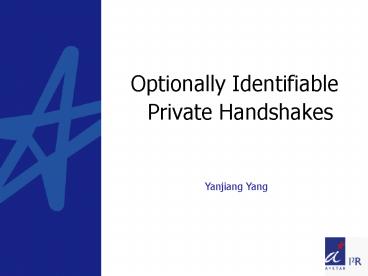Optionally Identifiable Private Handshakes - PowerPoint PPT Presentation
1 / 26
Title:
Optionally Identifiable Private Handshakes
Description:
Optionally Identifiable Private Handshakes Yanjiang Yang Agenda Introduction Review of Related Work Optionally Identifiable Private Handshakes Conclusion Introduction ... – PowerPoint PPT presentation
Number of Views:89
Avg rating:3.0/5.0
Title: Optionally Identifiable Private Handshakes
1
Optionally Identifiable Private Handshakes
Yanjiang Yang
2
Agenda
- Introduction
- Review of Related Work
- Optionally Identifiable Private Handshakes
- Conclusion
3
- Introduction
- Review of Related Work
- Optionally Identifiable Private Handshakes
- Conclusion
4
Secret handshakes
- Users are increasingly concerned about individual
privacy in cyberspace
- Privacy-preserving techniques are expected play a
key part
- Secret handshakes
- non-members learn nothing on the handshake
between the two users - A non-member cannot impersonate a member
5
Unlinkable secret handshakes
- Secret handshakes are linkable
- Unlinkable secret handshakes provides
unlinkability - Traceability is a feature of unlinkable secret
handshakes - Differences between unlinkable secret handshakes
and anonymous credentials
6
Private handshakes
Project Summary - why should it be done?
- Traceability may not be always desired
- Hoepman proposed the concept of private
handshakes - No traceability whatsoever in private handshakes
7
Optionally identifiable private handshakes
- Secret handshakes/private handshakes each have
own applications - A primitive optionally between them is more
flexible - We proposed the concept of optionally
identifiable private handshakes
8
Nutshell
(linkable) Secret handshakes
- Private handshakes
No identifiability
identifiability
Optionally identifiable private handshakes
Unlinkable secret handshakes
9
- Introduction
- Review of Related Work
- Optionally Identifiable Private Handshakes
- Conclusion
10
Secret handshakes
- Balfanz et al. first formulated the notion of
secret handshakes (SP03) - Castelluccia et al. proposed secret handshake
protocols, with security under computational
Diffie-Hellman assumption (Asiacrypt04)
11
Secret handshakes - continued
- Jarecki et al. (CT-RSA07) and Vergnaud et al.
(coding and cryptography05) proposed RSA-based
secret handshakes
12
Unlinkable secret handshakes
- Xu et al. proposed k-anonymous secret handshakes
(CCS04) - Tsudik et al. proposed (full) unlinkable secret
handshakes, but all members from the same group
are required to share a group secret - Jarecki et al.s scheme does not sharing of group
secret (ACNS07) - Ateniese et al. proposed fuzzy unlinkable secret
handnhakes (NDSS07)
13
Private handshakes
- Hoepma proposed private handshakes (security and
privacy in Ad Hoc and sensor networks07)
14
- Introduction
- Review of Related Work
- Optionally Identifiable Private Handshakes
- Conclusion
15
Model
Project Summary - why should it be done?
- Entities
- a set of users
- a set of groups
- a set of group administrators who create groups
and enrol users in groups. - a user may or may not be affiliated to a group
- if a user belongs to a group, then he is a member
of that group otherwise, he is non-member of
that group.
16
Model - continued
- Algorithms
- CreateGroup(1k)
- EnrolUser(G, u)
- HandShake(u1, u2, b)
- RevokeUser(G, u)
17
Details of algorithms
Project Summary - why should it be done?
- Parameters
- e(G1, G1) ?G2
- H0, H1,H2
- Enc().
18
Details of algorithms - continued
Project Summary - why should it be done?
- CreateGroup(1k)
- Group administrator selects sG
- EnrolUser(G, u)
- Group administrator issues u a credential xu
sGH0(u),
19
Details of algorithms - continued
Project Summary - why should it be done?
- Handshake(u1, u2, b)
R1r1H0(u1)
R2r2H0(u2) V2 H1(e(R1,r2xu2), b)
20
Details of algorithms - continued
H1(e(r1xu1, r2), b) ? V2 V1 H1(b, e(r1xu1,
R2)) sk1 H2(e(r1xu1, R2), R1, R2)
V1
H1(b, e(R1, r2xu2)) ? V1 sk2 H2(e(r2xu2, R1),
R1, R2)
So far, private handshake is completed!
21
Details of algorithms - continued
C1 Enc(sku1, r1, u1)
C1
(r1, u1) Enc(sku2, C1) R1 ? r1H0(u1) C2
Enc(sku2, r2, u2) sku2
C2
22
Future Work
- User Revocation
23
Security
- Impersonation resistance
- Membership detection resistance
- Unlinkability of private handshake
- Unlinkability to eavesdropper
24
- Introduction
- Review of Related Work
- Optionally Identifiable Private Handshakes
- Conclusion
25
Conclusion
- We proposed the concept of private handshakes
with optional identifiability, interpolating
between private handshakes and secret handshakes,
representing a more flexible primitive
- A concrete scheme was presented, and its security
was defined and proved.
26
Q A
Project Summary - why should it be done?
THANK YOU!































